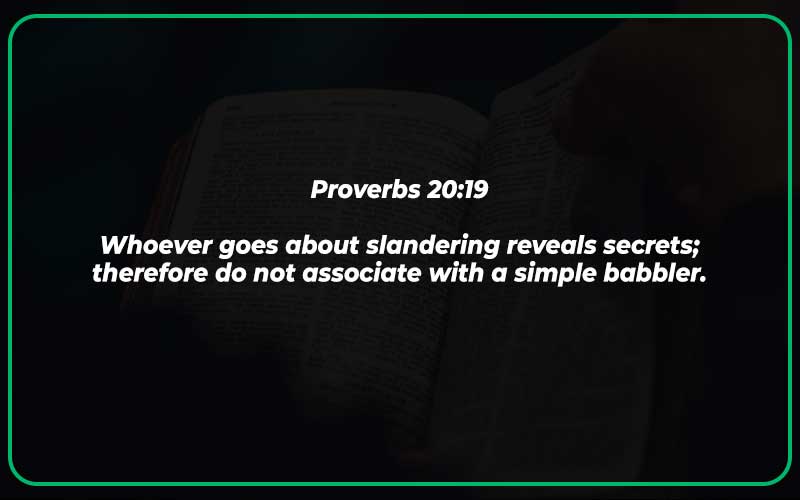Our words have the power to build up or tear down, making the control of our tongues crucial for maintaining healthy relationships and promoting peace.
Join us on a transformative journey through verses in the Bible that address the topic of bridling the tongue.
Discover the teachings and wisdom contained within these scriptures, offering insights on communication, kindness, and the transformative power of our words.
Also Read: 21 Bible Verses about Shifting in the Atmosphere (With Commentary)
Bible Verses about Bridle Tongue
Proverbs 10:19
When words are many, transgression is not lacking, but whoever restrains his lips is prudent.
This verse emphasizes the importance of controlling one’s words and practicing discretion in speech. It warns against the dangers of speaking too much or inappropriately, which can lead to transgression, but encourages the wise practice of restraint and prudence.
Proverbs 17:27-28
Whoever restrains his words has knowledge, and he who has a cool spirit is a man of understanding. Even a fool who keeps silent is considered wise; when he closes his lips, he is deemed intelligent.
This passage exhorts the value of exercising self-control over one’s speech, as it is a sign of wisdom and understanding. It also shows that even a fool can appear wise by controlling their tongue and refraining from speaking foolishly.
James 1:26
If anyone thinks he is religious and does not bridle his tongue but deceives his heart, this person’s religion is worthless.
James warns that true religion is not just outward acts, but also includes controlling one’s speech. Those who fail to bridle their tongues and speak in ways that are unkind or dishonest deceive themselves and render their religion worthless.
Proverbs 13:3
Whoever guards his mouth preserves his life; he who opens wide his lips comes to ruin.
This verse highlights the connection between our words and our well-being. By guarding our mouths and carefully choosing our words, we can preserve our lives, while recklessly speaking can lead to ruin.
Proverbs 21:23
Whoever keeps his mouth and his tongue keeps himself out of trouble.
This verse emphasizes the importance of self-control in speech, as it leads to avoiding trouble and preventing conflicts. It teaches that restraining one’s tongue is a form of self-preservation.
Colossians 4:6
Let your speech always be gracious, seasoned with salt, so that you may know how you ought to answer each person.
Paul instructs believers to choose their words carefully and use them to bless others, speaking with grace and wisdom. He encourages them to be able to give an appropriate response to others by seasoning their speech with salt, which represents wisdom and good taste.
Ephesians 4:29
Let no corrupting talk come out of your mouths, but only such as is good for building up, as fits the occasion, that it may give grace to those who hear.
Paul encourages believers to refrain from speaking corrupt, unedifying words, and instead to use language that builds others up and shows grace to those who hear it. He exalts the power of positive speech.

James 3:1-12
This passage is a cautionary tale about the tremendous influence of our tongues, comparing it to a bit in a horse’s mouth, a rudder on a ship, and a fire that can ignite great destruction. It warns against the dangers of uncontrolled speech, and calls for wisdom and discretion in how we use words.
James illustrates how great of an impact our tongues can have, both for good and for bad. He shows that it is a powerful tool that must be handled carefully and wisely, as it can determine one’s direction and shape the course of one’s life.
Proverbs 16:24
Gracious words are like a honeycomb, sweetness to the soul and health to the body.
This verse paints a beautiful picture of the power of kind, gracious speech. It compares it to a honeycomb, which brings sweetness and nourishment to both the soul and the body. It urges us to use language that is uplifting and life-giving.
Matthew 15:11
It is not what goes into the mouth that defiles a person, but what comes out of the mouth; this defiles a person.
Jesus reminds us that the real danger lies not in what we eat or drink, but in what we say. Our words have the potential to harm others and dishonor God, so we need to choose them carefully and seek to use them for good.
Proverbs 15:1
A soft answer turns away wrath, but a harsh word stirs up anger.
This verse teaches us the power of gentle speech and the ability to diffuse tense or volatile situations. It emphasizes that responding with kindness and wisdom can mitigate conflict and promote peace.
Proverbs 12:18
There is one whose rash words are like sword thrusts, but the tongue of the wise brings healing.
This verse highlights the contrasting effects of sharp, reckless words and wise speech that brings healing and restoration. It shows that careless language can cause deep emotional wounds, while wise and thoughtful words can bring about reconciliation and wholeness.
James 1:19
Let every person be quick to hear, slow to speak, slow to anger;
James teaches us that a bridle tongue comes with careful listening, he instructs us to be quick to listen, slow to speak and slow to anger. He emphasizes the importance of restraint and awareness as we communicate with others.
Matthew 12:36-37
I tell you, on the day of judgment people will give account for every careless word they speak, for by your words you will be justified, and by your words you will be condemned.
Jesus underscores the weight of our words and the tremendous responsibility that comes with using them. He warns us that we will be held accountable for every careless word we speak, and that they have the power to determine our destiny.
Proverbs 18:21
Death and life are in the power of the tongue, and those who love it will eat its fruits.
This verse speaks to the immense power of our words, noting their ability to bring about both death and life. It highlights the importance of our choices of speech and the resulting consequences.
Proverbs 15:4
A gentle tongue is a tree of life, but perverseness in it breaks the spirit.
This verse uses imagery to convey the impact of our words, comparing a gentle, kind tongue to a tree of life that brings nourishment and vitality. Conversely, the perverse and unkind tongue is destructive, causing brokenness and despair.
Proverbs 29:20
Do you see a man who is hasty in his words? There is more hope for a fool than for him.
This verse cautions us against being rash or impulsive in our speech, as it leads to reckless and unwise communication. It is a sharp rebuke for those who fail to exercise self-control and thoughtfulness in their words.
Proverbs 25:11
A word fitly spoken is like apples of gold in a setting of silver.
This verse celebrates the beauty and effectiveness of well-timed words that are thoughtfully chosen and communicated with grace. It compares them to the magnificence of precious jewels set in silver, highlighting their worth and value.
1 Peter 3:9
Do not repay evil for evil or reviling for reviling, but on the contrary, bless, for to this you were called, that you may obtain a blessing.
Peter instructs us to show restraint and grace in our words even when we are being provoked or mistreated. He reminds us that our calling as Christians is to be a blessing to others, even to those who may be difficult or unkind.
Proverbs 10:11
The mouth of the righteous is a fountain of life, but the mouth of the wicked conceals violence.
This verse highlights the contrast between the speech of the righteous, which brings forth life and vitality, and the speech of the wicked, which is characterized by concealment and violence.
Proverbs 20:19
Whoever goes about slandering reveals secrets; therefore do not associate with a simple babbler.
This verse warns us against the dangers of slander and gossip, noting that it can lead to disclosure of confidential information and damage relationships. It exhorts us to avoid those who are prone to idle chatter and focus on using our speech for good.

What does the Bible say about Bridle Tongue?
The concept of a “bridle tongue” in the Bible refers to controlling one’s speech and using words wisely and responsibly. The term is derived from the idea of using a bridle to control a horse’s movements, implying that just as a bridle guides and restrains a horse, our tongues should be guided and restrained to avoid causing harm or speaking inappropriately.
The Bible emphasizes the significance of using our words wisely and the potential consequences of uncontrolled speech. Several passages caution against the misuse of language, promoting the virtues of speaking with kindness, honesty, and love. Here are a few key points:
- Proverbs on Speech: The book of Proverbs is particularly rich in teachings about speech. It highlights that “reckless words pierce like a sword” (Proverbs 12:18) and that “the tongue of the wise brings healing” (Proverbs 12:18).
- James’ Epistle: The New Testament book of James also extensively discusses the power of the tongue. It compares the tongue to a small spark that can set a whole forest on fire (James 3:5) and warns against both blessing and cursing coming from the same mouth (James 3:10).
- Controlled Speech: The Bible advises believers to be slow to speak (James 1:19) and to avoid gossip, slander, and deceitful speech (Ephesians 4:29).
- Words of Encouragement: Christians are encouraged to use their words to build others up and encourage them (1 Thessalonians 5:11).
- Avoiding Quarreling: The Bible teaches against engaging in quarrels and arguments, which can often lead to harmful words (2 Timothy 2:23-24).
In summary, the Bible places great importance on the way we use our words and encourages believers to exercise control over their tongues. By speaking with love, kindness, and wisdom, we can bring healing, encouragement, and positive impact to those around us, fostering a spirit of unity and understanding.

